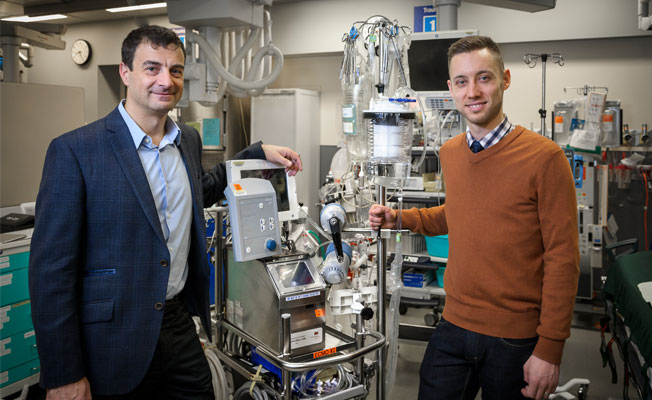A new study led by CHÉOS Scientist Dr. Brian Grunau will examine whether a cardiopulmonary resuscitation tool can increase the survival rate of people who experience sudden cardiac arrest out-of-hospital.
The trial, titled B.C. Extracorporeal Cardiopulmonary Resuscitation Trial for Refractory Out-of-Hospital Cardiac Arrest (ECPR), is a two-year study which will examine the benefits of a protocol that uses Extracorporeal Membrane Oxygenation – Cardiopulmonary Resuscitation (ECPR) for eligible patients with cardiac arrest who are unable to be revived.

The protocol is activated following initial failed on-scene efforts of paramedics to resuscitate patients with out-of-hospital cardiac arrest. Once activated, patients are transported to hospital and CPR is performed by a Lucas chest compression device, which allows for continuous, high-quality chest compressions. Traditional CPR cannot be effectively or safely delivered in a moving vehicle. Upon arrival at the hospital the patient is fitted with the ECPR machine, which functions as the heart and lungs while medical staff work to reverse the cause of the cardiac arrest.
Dr. Grunau and his colleagues at St. Paul’s Hospital will focus on improving outcomes for healthy, young people experiencing sudden cardiac arrest. Cardiac arrest is one of the leading causes of death across Canada; only about 14 per cent of patients survive cardiac arrests that occur out-of-hospital.
Dr. Grunau is an Emergency Physician at St. Paul’s Hospital and a Clinical Assistant Professor in UBC’s Department of Emergency Medicine. We asked him a few questions about this new trial.
CHÉOS: What is the optimal time for introducing ECPR on cardiac arrest patients?
Dr. Grunau: Survival after ECPR therapies is highly correlated with the duration of time from the arrest until ECPR initiation and thus the optimal time is as soon as possible. Survival is rare in patients who are initiated on ECPR after >75 minutes of CPR. One must also consider, however, that those who are quickly revived at the scene of the cardiac arrest by paramedics have the best outcomes, and thus we do not want to jeopardize outcomes of these patients by transporting too early for ECPR therapies. We analyzed this relationship in a previous publication that helped to inform the development of our protocol.
CHÉOS: Why have you and your team decided to focus on healthy, relatively young people experiencing cardiac arrest for this study?
Dr. Grunau: The purpose of CPR is to circulate blood throughout the patient’s body to maintain blood flow to the vital organs, particularly the brain. Unfortunately, this blood flow is not sufficient to maintain the needs of the organs indefinitely, and even with high-quality CPR irreversible organ damage will eventually occur. At minimum it takes 45 minutes from first paramedic contact to ECPR initiation in hospital, but typically closer to 60 minutes. The organs of younger and healthier patients may have the resilience to withstand this duration of low blood flow, but it is very unlikely that older, previously unwell patients would have a good outcome. Even in a very selected population we anticipate the proportion of survivors will only be approximately one-third; however, these are patients who had already failed full conventional resuscitative management and would have otherwise died.
CHÉOS: Can mechanical CPR replace manual (human-performed) CPR?
Dr. Grunau: Previously completed trials have failed to demonstrate that mechanical CPR is superior to human-performed CPR, so we do not have plans to use mechanical CPR on all patients. However, there is strong evidence that the quality of CPR performed by a mechanical CPR device during ambulance transport is superior to that of manual CPR, which is why mechanical CPR en route to hospital is an integral piece of the study protocol.
—
Press Release
Media Coverage
CBC News
Metro News
The Vancouver Sun


